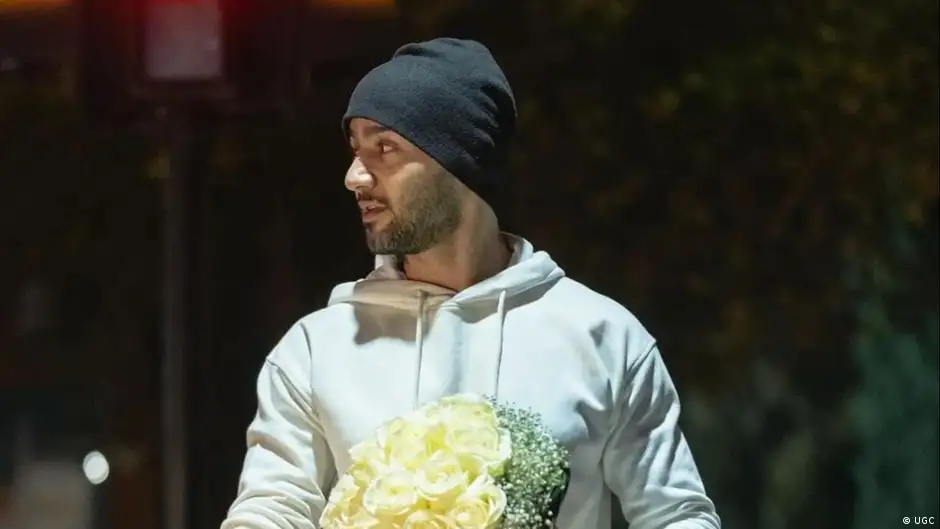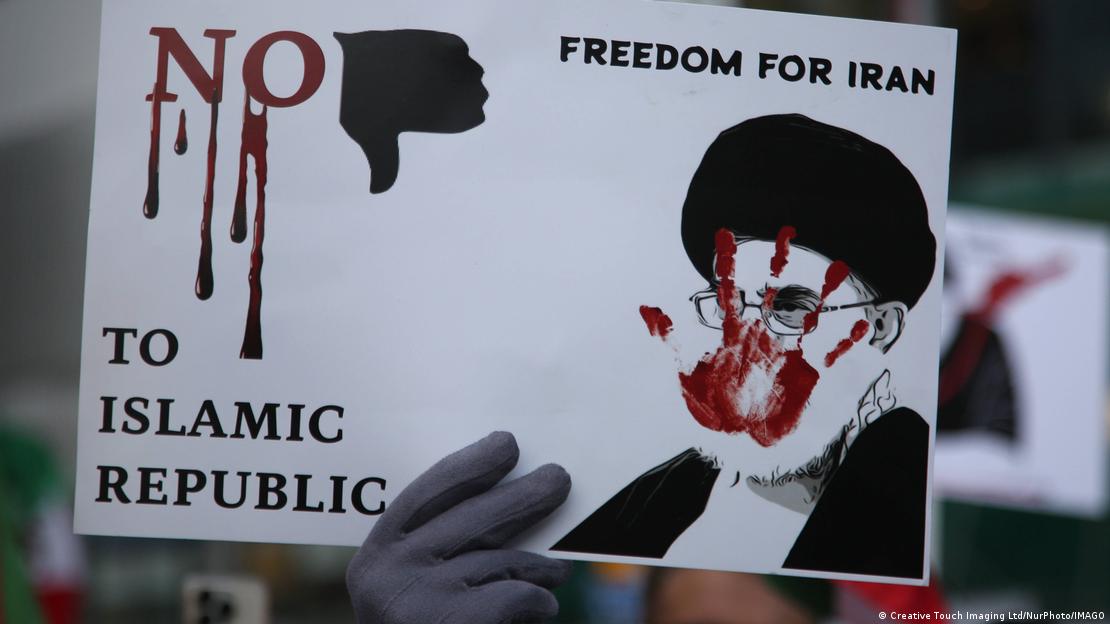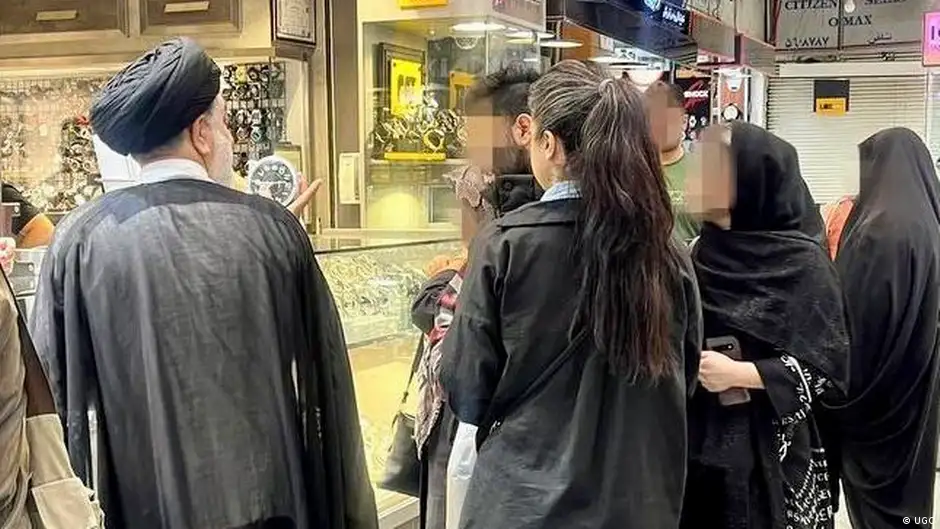Tehran's legitimacy crisis

His longest outbursts of anger are directed at the opportunists, the compromisers, the reform-minded, who go along with the regime in order to secure their shabby livelihoods, who sell out, who do business with the rulers, who are even prepared to act as informers and executioners. Making peace with the regime is the greatest of evils.
"I piss on your Oscar," raps Toomaj Salehi, referring to the award-winning director Asghar Farhadi, who is tainted for withholding criticism of the ruling system of the ayatollahs, mullahs and Revolutionary Guards in his films. Toomaj does not go easy on those in power. He openly wishes for their downfall. He predicts their doom, adding a threat: "The bludgeon of revenge is thick".
Toomaj's rap songs are calls for mass revolt, a verbal windup for carrying out the death blow against the tyrants. The mouseholes where those in power like to hide will no longer offer them any protection, he warns. Now the Iranian rapper Toomaj Salehi has been sentenced to death by a judge in Isfahan.
"Long live the revolution!"
When measured against the content of his tirades, the regime has turned the tables. Its response is a fitting reflection of the banal power conditions he laments.
Toomaj has spent most of the days and nights since the outbreak of the latest wave of protests against the Iranian regime in the autumn of 2022 in prison, where he has suffered humiliation and torture. But he doesn't like to talk about suffering. In his work, the now 33-year-old rapper adopts the pose of the subversive, shouting into the gun barrels of the firing squad: "Long live the revolution!"
Toomaj Salehi stands for a new type of regime opponent, someone who not only has the courage to die, but also with evident contempt for death. A similar stance was taken by Majidreza Rahnavard, who was hanged in December 2022. In an enforced interview on state television shortly before his execution in Mashhad, the young man encouraged his relatives and friends to dance on his grave instead of reciting from the Koran.
Such cases call to mind Alexei Navalny, who deliberately sought out his destiny, regarding his own death as the ultimate form of protest. These individualistic total revolutionaries have an undeniable public impact, because through their actions and the response of the ruling apparatus, the latter's rottenness and depravity are painted on the wall for all to see.
Violence directed inwards
These are regimes without any spirit, bereft of any form of legitimacy. The Iranian Toomaj has shaken up the hollow edifice of lies that is all that remains of the prevailing state ideology in his country: "In the end, all crimes come to light. No amount of whitewashing can hide them," he predicts.
The apparatus of power relies on the fact that it is armed to the teeth, while those in revolt are unarmed. This is a form of cowardice that the Iranian regime displays particularly blatantly. It directs its violence inwards, against Toomaj and those of like mind, and especially against women.
When it comes to foreign relations, however, those in power are turning tail, to put it in rapper-speak. They are afraid of an open war with Israel. In this respect, the reflexive reaction of the German media, which warns of the mullahs' bellicose military power, is missing the point.

The rise of the blackguards
The fact is that the Iranian regime can no longer hope to rally even a portion of the population behind it through a war with its arch-enemy. Such national mobilisation is known to have had a stabilising effect on the then-young Islamic Republic when faced with Saddam Hussein's attempted invasion in the 1980s.
Today, the decline of the Iranian regime goes hand in hand with the rise of the blackguards. The great portraitist of Iran's educated middle class, writer (and electrical engineer) Amir Hasan Cheheltan has vividly described in his novels the regime's secret pact with the brutal criminal fringe of society.
The turban wearers can only hold onto power because low-life thugs protect them. The soundness of this analysis is becoming increasingly clear. The current president of the Islamic Republic of Iran, Ebrahim Raisi, is literally a scoundrel.
He even falls far short of the spiritual and intellectual level of his predecessor Mahmoud Ahmadinejad, if anyone can still remember him. Raisi has the dubious privilege of competing with Itamar Ben Gvir, the Israeli police and security minister with a criminal record, for the dregs in these categories, which are not entirely inconsequential for the ability to govern.

"Rule of the worst elements"
Israel is not, as the historian Moshe Zimmermann says with perfect irony, the only kakistocracy in the Middle East. This "rule of the worst element" has become firmly established regionally. In this respect, Joe Biden and Xi Jinping will be able to compete at the next summit for who has the biggest headache when it comes to dealing with their allies in the Middle East.
"Lerd", Persian for dregs, is the name of one of director Mohammad Rasoulof's latest films offering an objective portrayal of society. The work is subtle and yet gets to the heart of the squalor of the Iranian regime.
Rasoulof, together with his equally dissident colleague Jafar Panahi, visited the rapper Toomaj when the latter was at large for a few days in November 2023. A historic photo documents this show of solidarity. The two patriarchs of subtle regime criticism take the young man in open revolt into their midst.
A short time later, Toomaj was back behind bars. Rasoulof and Panahi called the death sentence pronounced against the rapper "mediaeval". On the one hand, this characterisation is certainly apt.
Toomaj was convicted of "corruption on Earth". In its religiously tinged vagueness, this penal norm is conducive to bringing each and every persona non grata to the gallows.
On the other hand, the categorisation as "mediaeval" misses the deeper meaning of the Koranic term fasād fī-l-arḍ (corruption or perdition on Earth). Anyone looking at the political, social, moral and not least ecological state of the country would have to realise that no one is as guilty of this crime as the leaders themselves.
They have corrupted Iran. And in the process, they have permanently discredited Islam as a source of legitimacy for anything at all – a side effect that will please rash Western ideologues.
Contempt for death
There is something objectively inevitable about the appearance on the scene of someone like Toomaj Salehi. Who else, if not the internationally known street artist, should oppose the rule of the scoundrels? He foretells in his lyrics that the oppressors will soon swap roles with the oppressed. That doesn't sound very positive. As if the protest against the nihilistic regime were itself condemned to nihilism. As we know, the step from contempt for death to this forfeiting of all hope is not a large one.
But who is Toomaj? In reality, he is an unarmed and organisationally unaffiliated individual who conjures with his torrents of rage the fiction of being at eye level with his opponent. He tries to define a nationalistically charged "we" as the large group of those who are against the regime. On the one hand, this makes him vulnerable to a brutal crackdown. Toomaj turns both cheeks to those in power, so to speak.
Looming wave of despair
On the other hand, he is known throughout the country precisely because he lends expression to a widespread mood. Putting him to death will trigger a wave of despair. For those in power, this would not be without risk. The rapper himself has pointed that out. He announces in a song that, with their orgies of violence, the rulers will end up plunging their regime apparatus into chaos.
This is where, at the latest, the outside world comes into play again. Chaos is not a scenario designed to please European leaders. Where they themselves sit on the scale of good or bad governance is not the main issue here. Because no matter what, chaos in Iran would mean millions of refugees making their way to Europe. Even German Chancellor Olaf Scholz is likely to remember 2015 with its floods of refugees from Syria, where Assad's kakistocracy still governs around half of its original population.
Carrying out the death sentence against Toomaj would bring us one step closer to this happening again. Measured against this potential, the reaction of the German government can be described as restrained.
The Foreign Minister has maintained silence, leaving her human rights commissioner to protest the death sentence. Over the past two years, Annalena Baerbock and Olaf Scholz have repeatedly stated how important it is to keep the channels of communication with the Iranian regime open. What now? Which brings us back to the German government's Middle East policy.
© Qantara.de 2024
Translated from the German by Jennifer Taylor
The author is a television journalist for the broadcaster NDR.
